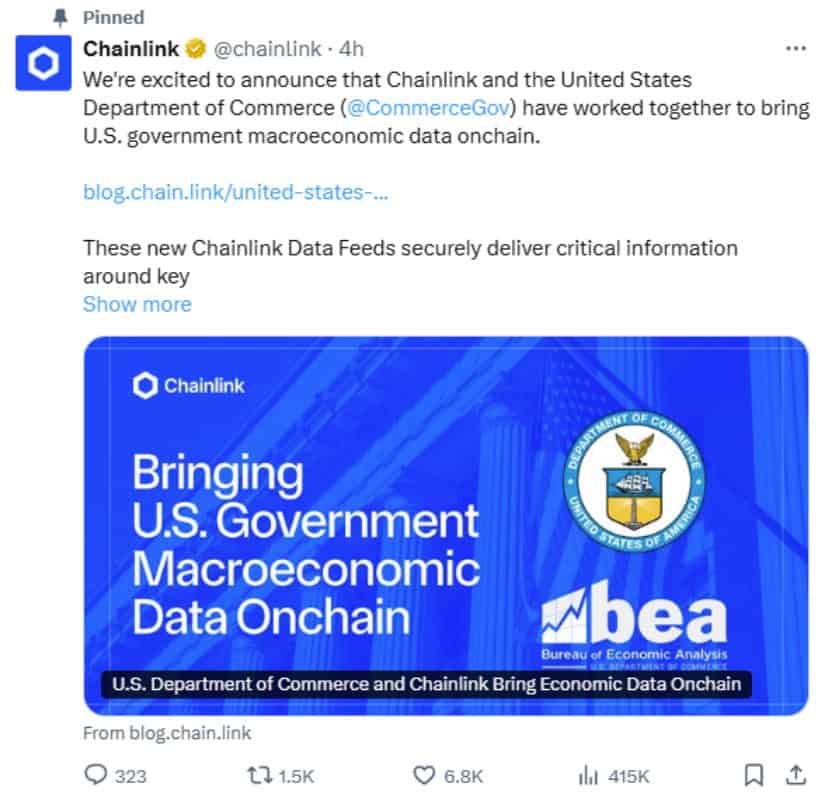On August 28, 2025, the Commerce Department decided to play nice with the tech world, announcing partnerships with Chainlink and Pyth Network to distribute key economic statistics across multiple blockchain networks. Commerce Secretary Howard Lutnick, who I can only assume has a secret lair filled with crypto gadgets, revealed this plan during a White House cabinet meeting on August 26. He told President Trump, “The Department of Commerce is going to start issuing its statistics on the blockchain, because you are the crypto president.” I mean, who knew that being the “crypto president” was a thing? 🤔
What Data Goes on Blockchain
So, what kind of riveting data are we talking about? The initiative focuses on six important economic indicators from the Bureau of Economic Analysis. These include real Gross Domestic Product (GDP)-which measures the country’s total economic output-and the Personal Consumption Expenditures Price Index, a fancy term for inflation. Because nothing says “fun” like tracking inflation, right? 🎉
The data covers both actual numbers and percentage changes over time. Updates happen monthly or quarterly, which is just enough time for everyone to forget what the last numbers were. This information helps economists, businesses, and investors understand how the US economy is performing, or at least gives them something to argue about at dinner parties.

Chainlink is doing the heavy lifting here, creating secure data feeds that deliver information to blockchain networks. Meanwhile, Pyth Network will provide quarterly GDP data going back five years, because who doesn’t love a good trip down memory lane? They plan to expand to other economic datasets later, presumably after they finish binge-watching their favorite shows.
Multiple Blockchain Networks Involved
The economic data will appear on ten different blockchain networks initially through Chainlink, including Ethereum, Avalanche, and Arbitrum, along with newer networks like Base and Optimism. The Commerce Department also mentioned broader distribution across additional networks, including Bitcoin and Solana. Because why not throw a blockchain party and invite everyone? 🎊
The government uses a special process to ensure data accuracy. They create a unique digital fingerprint (cryptographic hash) of each data point and store it on the blockchain. This makes it nearly impossible to change or fake the information once it’s published. So, if you were hoping to pull a fast one, think again!
Major cryptocurrency exchanges Coinbase, Gemini, and Kraken helped set up the system. They provided the digital currency needed to pay for blockchain transaction fees, which is just a fancy way of saying they’re in it for the money. 💰
//bravenewcoin.com/wp-content/uploads/2025/08/Bnc-Aug-28-619.jpg”/>
The timing is significant because the administration has criticized traditional government data collection methods. Earlier in August 2025, President Trump fired the Commissioner of Labor Statistics after questioning the accuracy of employment reports. Trump claimed some government statistics were “rigged” for political purposes. I mean, who doesn’t love a good conspiracy theory? 🕵️♂️
By using blockchain technology, officials hope to create a system where published data cannot be secretly changed later. This could help rebuild public trust in government statistics, or at least give them something to point to when they’re trying to convince us they’re not just making it all up.
The Deploying American Blockchains Act, which passed the House with bipartisan support in June 2025, gives the Commerce Department authority to lead federal blockchain policy. The bill awaits Senate approval, which is basically like waiting for your cat to decide if it wants to sit on your lap.
Practical Applications
The blockchain economic data opens up new possibilities for financial technology developers. They can build automated trading systems that respond to economic changes in real-time. Prediction markets could use the data to forecast economic trends, or at least pretend they know what’s going to happen next.
Decentralized finance (DeFi) platforms might adjust interest rates based on GDP growth or inflation data. Stablecoins and tokenized assets could benefit from having reliable government economic data built into their systems. Because who doesn’t want their money tied to government statistics? Sounds like a solid plan! 🙄
However, blockchain technology has limitations. While it prevents data tampering after publication, it cannot fix problems with how the government collects information in the first place. If agencies gather incorrect data, blockchain will permanently preserve those errors. So, congratulations! You’ve just locked in your mistakes forever!
Future Implications
The US government’s partnership with Chainlink and Pyth Network represents a major step forward for both blockchain technology and government transparency. Secretary Lutnick indicated that blockchain-based data publishing could expand across the entire federal government, with other agencies potentially adopting similar systems once technical details are worked out. Because nothing says “efficiency” like a government project, right? 😅
This initiative demonstrates that blockchain infrastructure has matured enough to handle critical government functions. The immediate market reaction shows strong investor enthusiasm for government-blockchain partnerships, suggesting these collaborations could become increasingly valuable for infrastructure providers. Or at least, that’s what they’re hoping for while they watch the stock market like hawks.
The trend extends beyond US borders. Estonia has used blockchain to protect medical records since 2016, while California moved 42 million vehicle titles to blockchain in 2024 to prevent fraud. The Philippines, United Kingdom, and El Salvador are all considering putting government spending data on blockchain networks, indicating growing international adoption of blockchain in government operations. Because if it works for one country, it must work for all, right? 🌍
Read More
- Silver Rate Forecast
- Gold Rate Forecast
- USD CNY PREDICTION
- Brent Oil Forecast
- Bitcoin Plummets Below $98K: Fear Grips Market Like a Bad Soap Opera 🎭
- DeFi Meltdown: Yearn Finance’s yETH Pool Drained by a Rogue Algorithm 🤖💸
- USD THB PREDICTION
- AI and Copyright: Mark Twain’s Take on the Modern Patent Circus
- Blockchain Dawn in the Developing World 🌍✨
- STETH PREDICTION. STETH cryptocurrency
2025-08-29 01:34